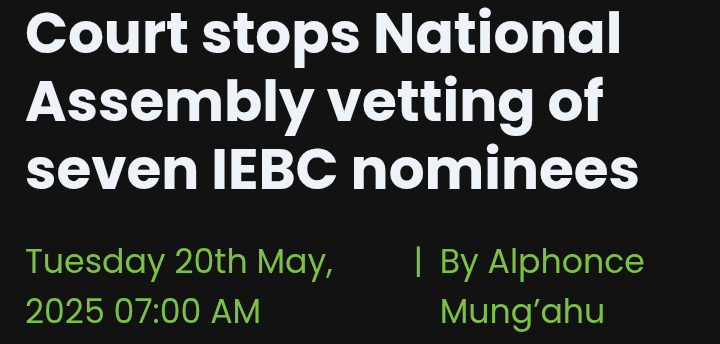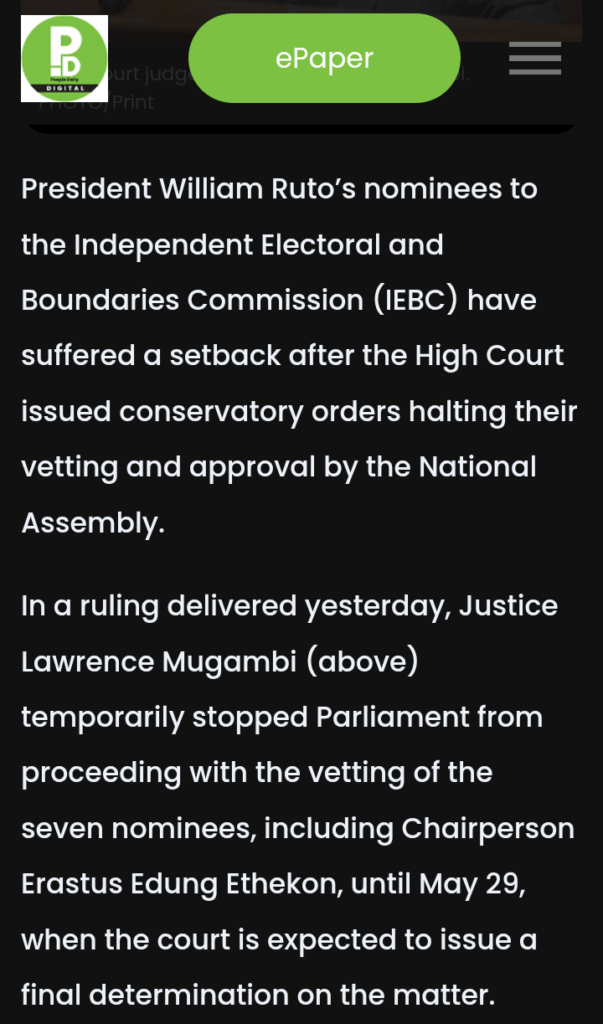President William Ruto’s nominees to the Independent Electoral and Boundaries Commission (IEBC) have faced a major setback after the High Court issued orders stopping their vetting and approval by Parliament. Justice Lawrence Mugambi delivered the ruling, temporarily halting the vetting process until May 29, when the court will give a final decision on the matter.
This means the National Assembly cannot proceed with approving the seven nominees, including the chairperson nominee Erastus Edung Ethekon, until then.The seven nominees were selected after interviews by a panel led by Nelson Makanda.
After the panel made their recommendations, President Ruto sent their names to Parliament for approval. However, this court order now delays the reconstitution of the IEBC. This delay could affect the commission’s readiness for important tasks like the mass registration of voters and upcoming by-elections.

The court’s intervention came after a petition was filed by two citizens, Kelvin Omondi and Boniface Mwangi. They challenged the way the nominees were selected, saying the process was not legal or transparent.
The two citizens were represented by lawyers Paul Muite and Ochieng Odinga. Their argument was that the selection process had many irregularities and did not follow constitutional rules.
They said it ignored important principles like merit-based appointments, regional and ethnic balance, and inclusion of persons with disabilities. They also argued that the public was not properly involved in the process as required by the constitution.
One big concern raised in the petition was about Commissioner Hassan Noor. The petitioners said his name was not part of the initial shortlist or the advertised list of nominees. Lawyer Paul Muite told the court that including Hassan Noor was a deliberate attempt to break the rules.
He said Noor was not originally considered or advertised by the selection panel, making his nomination questionable.The legal team warned that if the vetting goes ahead before these issues are resolved, it could damage the credibility of the IEBC.

They said this might cause political instability in the future, as trust in the electoral body would be weakened. On the other hand, the Attorney General’s office did not agree with the court’s decision. Chief State Counsel Emmanuel Bitta argued that the petition was premature and that the court was going beyond its role by interfering with the vetting process at this stage.
The National Assembly’s Departmental Committee on Justice and Legal Affairs was scheduled to start vetting Erastus Ethekon and the six other commissioner nominees on May 26. The House had also invited the public to send memoranda during a two-week window to express their views about the nominees.
This court order means the entire process to approve the new IEBC team has been put on hold. The final decision on whether the vetting can continue or not will come after May 29. Until then, the delay raises concerns about how prepared the IEBC will be for upcoming elections and voter registration exercises, which are very important for the country’s democracy.


